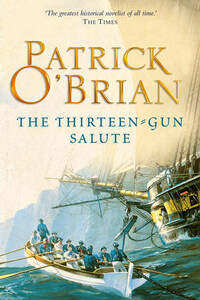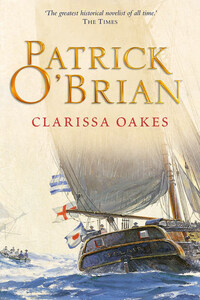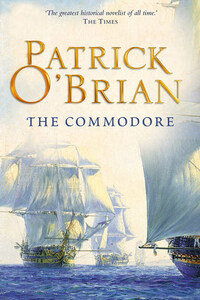The sails of a square-rigged ship, hung out to dry in a calm.
1 Flying jib
2 Jib
3 Fore topmast staysail
4 Fore staysail
5 Foresail, or course
6 Fore topsail
7 Fore topgallant
8 Mainstaysail
9 Main topmast staysail
10 Middle staysail
11 Main topgallant staysail
12 Mainsail, or course
13 Maintopsail
14 Main topgallant
15 Mizzen staysail
16 Mizzen topmast staysail
17 Mizzen topgallant staysail
18 Mizzen sail
19 Spanker
20 Mizzen topsail
21 Mizzen topgallant
Illustration source: Serres, Liber Nauticus. Courtesy of The Science and Technology Research Center, The New York Public Library, Astor, Lenox, and Tilden Foundation
Chapter One
In spite of the hurry, many wives and many sweethearts had come to see the ship off, and those members of her company who were not taken up with sailing her on her difficult course close-hauled to the brisk south-east breeze, watched the white flutter of their handkerchiefs far across the water until Black Point hid them entirely, shut them right out.
The married men on the quarterdeck of the Surprise stepped back from the rail with a sigh and clapped their telescopes to. They were all sincerely attached to their wives, and they all – Jack Aubrey, her commander, Captain Pullings, a volunteer acting as his first lieutenant, Stephen Maturin, her surgeon, and Nathaniel Martin, his assistant – they all regretted the parting extremely. Yet it so happened that from a variety of official delays and other causes they had all had an unusually long spell of domesticity; some had found their consequence much reduced by the coming of a baby; others had suffered from occasional differences of opinion, from relatives by marriage, smoking chimneys, leaks in the roof, rates, taxes, the social round, insubordination; and turning they now looked to the clear south-west, the light-blue sky with a fleet of white rounded clouds marching over it in the right direction, the darker blue sea drawn to a tight line high on the horizon, and beyond that horizon endless possibilities even now, in spite of their late and inauspicious start.
It would be an absurd exaggeration to speak of a feeling of escape or holiday; but underlying the regret there was a sense of a return to a simpler world, one in which the roof, or what passed for it, was not expected to be universally waterproof, where chimneys and the poor-rate amounted to little, where a settled hierarchy, independent of moral or intellectual merit, did away if not with difference of opinion then at least with its more candid expression, a world in which there were no morning calls and in which servants could not give notice; a world devoid of most comforts, complex enough in all conscience, and not without its dangers, yet one whose complexity was as who should say more direct, less infinitely various; and above all a world that they were used to. Jack Aubrey, by a mere count of days, must have spent more time afloat than ashore; and if the formative years of his youth were given greater value, an impartial observer might have set him down as nine-tenths marine, particularly as his strongest emotions had all been known at sea. To be sure, love and an encounter with the law at its most unjust had marked him deeply by land, but these feelings, powerful though they were, could not equal those he had known as a sailor in number or intensity. Quite apart from the extreme perils of storm and shipwreck natural to his calling, he had fought in more great fleet battles and in more single-ship actions than most officers of his time. He had boarded many and many an enemy and it was at these times that he felt most wholly alive. Ordinarily he was not at all aggressive – a cheerful, sanguine, friendly, good-natured creature, severe only in the event of bad seamanship – but when he was on a Frenchman’s deck, sword in hand, he felt a wild and savage joy, a fullness of being, like no other; and he remembered every detail of blows given or received, every detail of the whole engagement, with the most vivid clarity.
In this he was quite unlike his friend Maturin, who disliked violence and who took no pleasure in any battle whatsoever. When he was obliged to fight he did so with a cold efficiency, but never without an apprehension that had continually to be mastered, disliking both the occasion and the recollection of it.
Martin, the surgeon’s mate, was no berserker either, perhaps in part because he was a clergyman (though unbeneficed and for this occasion ‘unreverend’ too, since he had left his cloth behind for the voyage, the immensely long voyage, perhaps a circumnavigation, sailing as Maturin’s assistant) but quite certainly because he could feel no anger, no fighting anger, until he had been seriously attacked, and not a very great deal even then – only a wild, indignant sense of defence. Indeed there were probably as many attitudes towards battle in the ship as there were men, and as many kinds of courage; yet though the variation might run from Awkward Davies’s dark lethal subhuman fury to Barret Bonden’s simple delight in the excitement, the immense excitement, there was nobody aboard the














